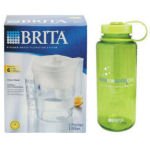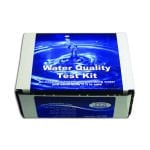News of BPA-laced water bottles, environmental woes caused by people not recycling or empty bottled water bottles, revelations that some bottled water comes from municipal water systems and other tidbits of information have put the bottled water industry on its heels… and now this.
A town in Australia banned bottled water AND London has decided to install chilled water vending machines on a trial basis in several highly trafficked locations.
London may soon follow in the footsteps of Bundanoon, the Australian town that last week banned bottled water and set up drinking fountains for thirsty locals.
The capital’s first water stations will be set up this month in a move that could have serious repercussions for the £1.5bn-a-year bottled water industry, with companies finding it increasingly difficult to justify their carbon footprint as the quality of tap water improves.
Thames Water, Britain’s largest privatised water company, with 13.6 million customers, has had talks with the Greater London Authority and Transport for London to install water machines in the capital. In the first trial, Hydrachills will be installed at Hammersmith bus station and at the Tower Bridge museum. The machines can fill bottles of up to 500ml with chilled water for a 20p charge. All proceeds will be donated to Waste Watch, a charity working to change the way people use natural resources. ( source )
This means a whole lot of thirsty commuters will soon have the option of filling up personal water bottles at home and then refilling with clean, chilled water on their way to the office for a much less money than they would normally spend on bottled water.
So the question becomes, will London commuters take advantage of this fantastic money-saving opportunity? We think that will depend upon the quality of their water at home and the quality of the water dispensed by the machines.
So, as usual, we suggest people test their drinking water for contaminants on a periodic basis with a test kit such as the SenSafe Water Quality Test Kit which tests for contaminants commonly found in drinking water.
Testing procedures in the kit come from recognized water testing methods, the kit contains no harsh chemicals (liquids, tablets, etc.), it comes with clear, easy-to-follow instructions, and best of all it provides accurate results without the need for expensive testing equipment.
The SenSafe Water Quality Test Kit includes:
- Sulfate Test Strips (2)
- Chloride Test Strips (2)
- Nitrate Test Strips (2)
- Nitrite Test Strips (2)
- Iron Test Strips (2)
- Copper Test Strips (2)
- Free Chlorine Test Strips (2)
- Hydrogen Sulfide Test Strips (2)
- pH Test Strips (2)
- Total Alkalinity Test Strips (2)
- Total Chlorine Test Strips (2)
- Total Hardness Test Strips (2)
- Pesticide Test (1)
- Bacteria Test (1)
- Lead Test (1)
Table SenSafe Water Quality Test Kit also includes a handy table record and compare your results against USEPA recommended levels for drinking water.






